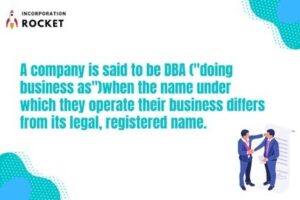Business
Do All Businesses Need To Obtain A DBA?
The ecosystem of business ownership in America has changed over the decades, but those lucky enough to consider themselves business owners still represent 34% of nonfinancial assets when compared to the share of nonfinancial assets American families own. In 2019, the Small Business Administration Office of Advocacy revealed how the average working-class family net worth of $90,000 is nearly four times smaller than that of self-employed families with an average net worth of $380,000. These figures show how the road to wealth is paved with the hardship and dedication of owning and operating a business in modern-day America.
Owning a business has all of its perks, from being your own boss to deciding on which exciting ventures you’re willing to create for yourself and others. It offers a psychological fulfillment in the mind, but although being your own boss, and perhaps scooping up all the profits might sound like a great idea – there are various complications, and steps one needs to consider and complete before you can open your doors to your first customers. Entrepreneurs share a great deal of insight on how to get your business off the ground, and in this article, we revisit the idea of a ‘DBA’ also known as ‘Doing Business As.’ Read below our commentary.
What is a DBA or Doing Business As?
For small business owners, and startup entrepreneurs, filing a DBA can be an important aspect if they would like to enjoy the benefits of keeping their registered business structure (i.e. LLC, sole proprietorship, corporation), and conducting business under their legal name. Simply put, a DBA name helps business owners to conduct business under a fictitious name that isn’t their legal or personal name.

Let’s look at this example:
Martin Redding is the owner of a small LLC business that sells hardware. He registered the name of his business as “Martin Redding Hardware,” the same as his legal or personal name. Currently, he’s thinking of changing the business name to “Winner Hardware” while still maintaining his LLC status and business structure. This means that Martin will need to file and submit a DBA with the local government agencies.
Why does a DBA benefit the business?
There are various reasons why registering or filing a DBA can benefit both the business owner and the business. Mostly it comes down to a few important things:
- Opening a business bank account for a business, rather than an individual will be a lot easier.
- In some states, banks require you to have a DBA before formally applying for a business bank account or loan.
- Your personal and legal name will remain out of public scrutiny.
- It gives owners some form of anonymity.
- Finally, it can give a look and feel of professionalism to the business, and make it seem more unique to the general public.
Is it difficult to file a DBA?
In some states, a DBA is not required, which creates the problem of ‘nonexclusivity’ for some business owners. What this means is that another bigger, or multinational corporation can come and use your business name as their own, in a different state and it can’t offer you any exclusivity to the name.
So, filing a DBA can be an important step any business owner or new entrepreneur should consider, and the process is not that difficult or complex at all. There is a simple form you can complete and submit, with some states requiring you to submit your application at the county level, instead of a state level. Completing the form is easy, and you will need to indicate the name of your business, the nature thereof, and personal information. DBA fees can range from $10 to $130, depending on where you reside, and can be directly paid on submission.
The takeaway
Filing your DBA name isn’t the most difficult and complex of processes in the business formation procedure, but it can be a crucial one if you’re looking to have some form of anonymity as a business owner. A ‘doing business as’ name can benefit the business in a financial sense, to receive a business bank account, but ultimately it also adds a more exclusive and unique sense to the business.

